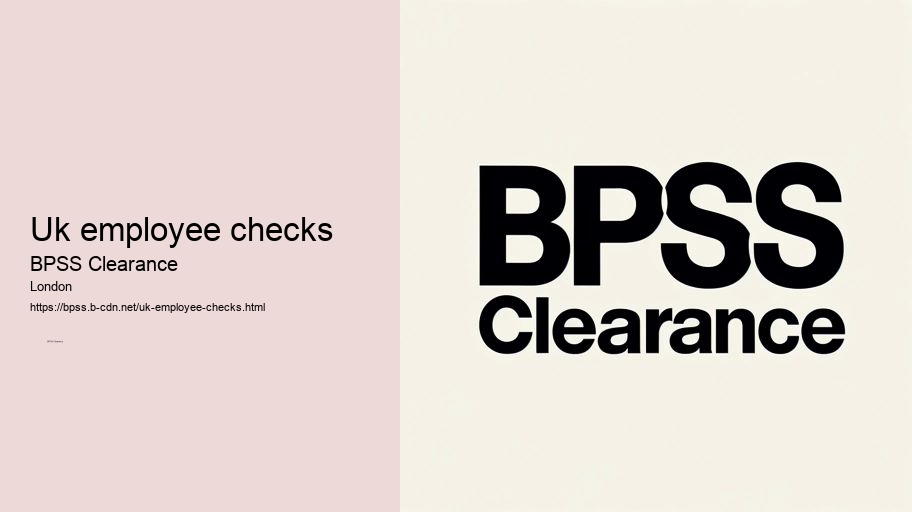
Digital technology has significantly streamlined the Baseline Personnel Security Standard (BPSS) process by enabling faster gathering and verification of applicant information. Automation tools and online databases allow for rapid identity verification and employment history checks, reducing the time it takes to complete a BPSS clearance compared to manual processes.
One of the major differences lies in the handling and treatment of criminal records. BPSS checks usually involve a basic disclosure, revealing only unspent convictions under the Rehabilitation of Offenders Act 1974. Conversely, BS7858:2019 can require a more thorough examination, potentially including spent convictions and other details depending on the risk assessment of the specific job role, reflecting its focus on positions where security is critically important.
In some cases, BPSS checks can encounter delays if discrepancies or issues need to be resolved, such as gaps in employment or discrepancies in personal information. Such issues require additional investigation and possibly further documentation, which can prolong the process.
Navigating the BPSS process can pose challenges, particularly when verifying identity and employment history manually. Delays often occur during manual verification processes, impacting the overall clearance timeline.
The right to work check under BPSS serves as a legal safeguard that prevents illegal employment. In the UK, it's mandatory for employers to ensure that their employees have the legal right to work before commencing employment. Failure to verify this can lead to severe penalties, fines, and reputational damage for the organization if they are found to be employing someone illegally.
Ultimately, BPSS clearance plays a critical role in maintaining a secure work environment, reducing risks, and building trust in recruitment processes and decision-making.

Can You Fail a Bpss?
Lastly, education professionals, particularly those in positions of trust and responsibility such as headteachers or senior administrators, often need BPSS clearance. They work in environments with young and vulnerable individuals and must ensure a safe and secure educational setting.
- Highlight any security-sensitive activities or exposures encountered while abroad.
Who Needs a BPSS Check, Confirming the need for a BPSS check involves identifying specific roles and sectors where clearance is mandatory to safeguard sensitive information and establish trustworthiness.
BPSS is essential for roles accessing sensitive government assets, whereas DBS is commonly used in sectors like healthcare and education. Employers often require both checks to thoroughly screen candidates, ensuring safety and trust in their workforce.
For compliance, it is vital that employers keep records of the documents checked as part of the right to work process. These records must be stored securely and retained for the duration of the employee's employment and for two years afterwards, as stipulated by the Home Office. This documentation can be critical in proving that the employer has diligently followed legal requirements should their compliance ever be questioned.

BPSS clearance is essential for those working in roles that require high levels of trust and integrity, especially within the UK government. Ensuring that individuals have BPSS clearance helps maintain national security and reduces the risk of insider threats. By vetting individuals' backgrounds, the government ensures that sensitive information remains protected from those who might misuse it. This process is crucial in safeguarding the nation's security infrastructure and upholding public safety standards.
These screenings affirm identity, employment history, national and immigration status, criminal record, and time spent abroad. Individuals needing access to UK OFFICIAL assets and occasional access to UK SECRET assets must undergo BPSS screening to uphold trustworthiness, honesty, and integrity in their roles.
What Is the Difference Between Bpss and Dbs? When distinguishing between BPSS and DBS checks, it's vital to recognize that BPSS focuses on national security vetting, identity verification, and right to work status, while DBS solely examines an individual's criminal record.
The identity verification process is a crucial part of BPSS checks. It requires individuals to provide valid, government-issued identification documents, such as a passport or driver’s license. This step ensures that the candidate is who they claim to be and helps prevent identity fraud.
Generally, a BPSS check can take anywhere from two weeks to a month to complete. This timeframe assumes that there are no complications, such as discrepancies in the information provided or delays in receiving necessary documents from third parties.
- Any connections or affiliations established overseas should be clearly communicated.

The process of obtaining BPSS clearance includes a detailed review of the applicant's identity documents, such as passports or driver's licenses. Security clearance This step is vital to confirm that the individual is who they claim to be, which is fundamental in preventing identity fraud within high-security environments. Proper identification is the cornerstone of the BPSS clearance process and helps maintain the integrity of the workforce within protected sectors.
- Providing reasons for extended stays abroad can help clarify your activities during that time.
A crucial part of the BPSS clearance is the criminal record check, which helps identify any unspent convictions the applicant may have. This information is critical in assessing whether an individual might pose a risk to national security or the safety of the public. By ensuring that employees do not have harmful criminal backgrounds, organizations can maintain a safe and secure working environment.
